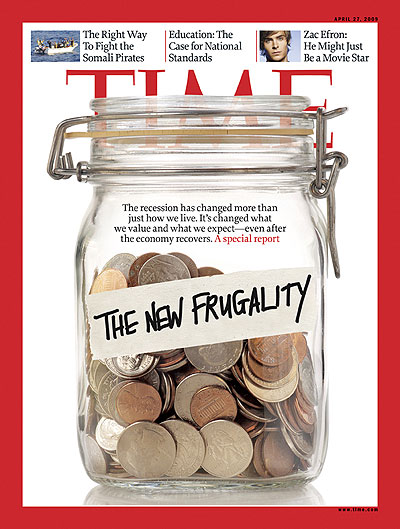Whether there’s a shared sense of the narrative of the recession, or perhaps some collective wishful thinking, certain stories seem to be popping up frequently:
- The recession is causing Americans to re-examine their consumerist spendaholic ways
- Layoffs are prompting Americans to pursue new, more fulfilling career paths
I think the common thread in both these themes is a hope that something good will come of the Great Recession.
Thanks to a relaxing long weekend with no agenda but to relax, I caught up on a huge amount of reading. The old-fashioned kind, with ink on paper.
 Back at the end of April, Time magazine touted a special report on its cover: The recession has changed more than just how we live. It’s changed what we value and what we expect – even after the economy recovers.
Back at the end of April, Time magazine touted a special report on its cover: The recession has changed more than just how we live. It’s changed what we value and what we expect – even after the economy recovers.
In an examination of how Americans are feeling, including a survey of 1,000 people, they write:
No one wishes for hardship. But as we pick through the economic rubble, we may find that our riches have buried our treasurers.
Money does not buy happiness; Scripture asserts this, research confirms it. Once you reach the median level of income, roughly $50,000 a year, wealth and contentment go their separate ways, and studies find that a millionaire is no more likely to be happy than someone earning one-twentieth as much.
Now a third of people polled say they are spending more time with family and friends, and nearly four times as many people say their relations with their kids have gotten better during this crisis than say have gotten worse.
I read New York magazine’s take on this cultural shift first, so that’s the one I blogged about originally.
It does make we wonder if this change is actually already happening, or if there’s the potential for self-fulfilling prophecy – if enough respected news outlets say it, will we make it so?
Do you think we’re changing our behaviors and values because of the recession? Are you changing yours?
More on shifting career paths later …

